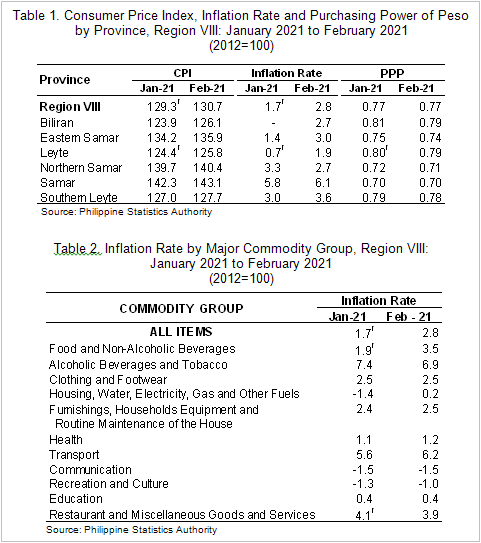DPWH-Biliran DEO
ground breaks two major projects in Biliran
|
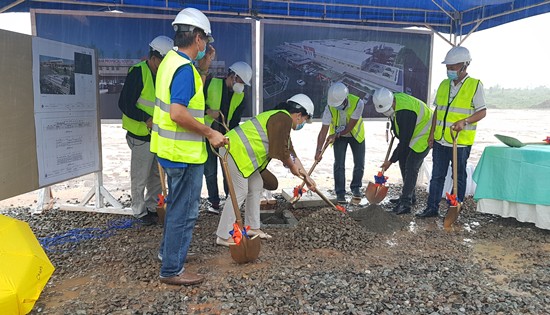
Congressman
Gerardo J. Espina, Jr. leads in the laying down of time
capsule and groundbreaking for the Construction of the New
Biliran Provincial Hospital at Barangay Larrazabal, Naval,
Biliran, March 11. Congressman Espina is joined in by
Biliran Sangguniang Panlalawigan Board Member Miguel Casas,
Dr. Joyce Pla-Caneja, Chief of Biliran Provincial Hospital,
DPWH-BDEO District Engineer Ferdinand A. Briones, Napoleon
Consebido, Sr. of Aqualine Construction that undertakes the
site development project of the New BPH, DPWH-BDEO Assistant
District Engineer Alfredo Bollido, and Biliran Vice-Governor
Brigido Caneja III. |
By
DPWH-Biliran
March 25, 2021
NAVAL, Biliran –
The site development project for new Biliran Provincial Hospital (BPH)
and the construction of Graduate School and Administrative Building
in Biliran Province State University (BiPSU) will begin its
construction following the groundbreaking ceremony by the Department
of Public Works and Highways (DPWH) -Biliran District Engineering
Office on March 11, 2021.
According to District
Engineer (DE) Ferdinand A. Briones, developing the site is needed
before the construction of the new BPH building at Brgy. Larrazabal,
Naval, Biliran. This project has a contract cost of P28.8M which
involves embankment and the construction of drainage.
Briones revealed that the
site for the soon to rise building is abundant with water because of
the presence of spring.
“First time in history na
mag-ooverflow ang water supply sa isang ospital dahil may katabi
ditong (site) spring, and that spring ay simbolo na magkakaroon pa
ng konting beautification at landscape ang ospital,” said Briones.
Briones added that there
will also be an underground water storage to supply the whole
hospital with a potable water.
According to the District
Engineer, the structure is stable enough to sustain the building
because it has been designed to withstand external forces.
The site development
project undertaken by Biliran DEO is in preparation for the
construction of new Biliran Provincial Hospital (BPH) which will be
undertaken by the DPWH Regional Office VIII with a total amount of
P400M.
The groundbreaking
ceremony was led by Biliran Congressman Gerardo J. Espina, Biliran
Vice-Governor Brigido Caneja III, representing Biliran Governor
Rogelio J. Espina, District Engineer Ferdinand A. Briones, Assistant
District Engineer (ADE) Alfredo L. Bollido, Biliran Sangguniang
Panlalawigan Board Member Miguel Casas, Dr. Joyce Pla-Caneja, Chief
of Biliran Provincial Hospital and Napoleon Consebido, Sr. of
Aqualine Construction, contractor of the site development project of
the New BPH.
Meanwhile, a 5-storey
Graduate School and Administrative building will also rise in
Biliran Province State University (BiPSU) in Naval, Biliran, the
only state university in the Province.
According to Dr. Victor C.
Cañezo, University President, the realization of the project will
greatly aid the lack of classrooms for the graduate students of the
school as well as provide a convenient workplace for the
administrative staff.
“This event is historical
because after how many years since our conversion as higher
education institution sometime in 1946, finally BiPSU, formerly
Naval Institute of Technology and Naval State University will now
have its administration building because currently, our
administration offices are just lodged in the different classrooms
in the University,” said Cañezo.
The construction of the
said project will be implemented by phases. First phase of the said
project has a contract amount of P13.5M.
Biliran Congressman Espina,
Jr., together with University President Cañezo, Biliran
Vice-Governor Caneja III, DE Briones and ADE Bollido led the
groundbreaking ceremony of the Graduate School and Administrative
building.
National Microinsurance
Forum showcases a thriving microinsurance sector
|
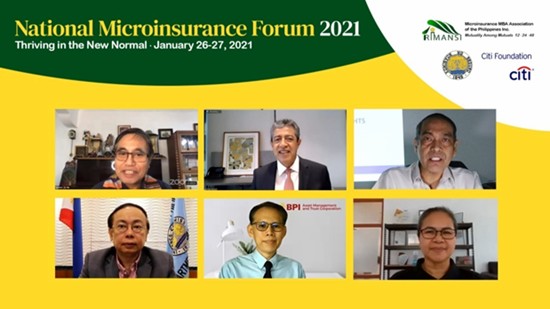
The
government and the private sector work together with
microinsurance mutual benefit associations to bring
microinsurance to millions of Filipinos. (Upper left to
right): RIMANSI Chairman Emeritus Dr. Jaime Aristotle Alip;
Citi Philippines CEO Aftab Ahmed; Department of Finance
Undersecretary & Chief Economist Gil Beltran. (Lower left to
right): Philippine Insurance Commissioner Atty. Dennis Funa;
BPI AMTC Chief Investment Officer Smith Chua and RIMANSI
President Silvida Antiquera. |
By
CARD-MRI
March 25, 2021
SAN PABLO CITY –
More than 20 million Filipinos are enjoying the benefits of mutual
microinsurance, providing protection to individuals with low incomes
especially through these challenging times.
Insurance Commissioner
Atty. Dennis Funa credits microinsurance mutual benefit associations
(Mi-MBA) in successfully bringing microinsurance to 26.66 million
individuals, reaching 69% of the country’s total insurance outreach.
“MBAs have been very effective in providing assistance to millions
of beneficiaries in times of crisis,” said Atty. Funa.
In late January 2021, over
400 microinsurance stakeholders joined the National Microinsurance
Forum hosted by the Microinsurance MBA Association of the
Philippines Inc. (MiMAP, also known as RIMANSI) via Zoom and
Facebook Live. With the theme ‘Thriving in the New Normal,’ the
forum featured various responses of the local microinsurance sector
to provide sustained, timely and appropriate delivery of much needed
microinsurance services and support to low-income Filipinos, amid
the COVID-19 pandemic and other natural calamities in 2020. Last
year, MiMAP members collectively settled 66,847 claims amounting to
PhP1.62 billion.
Citi Foundation and Citi
Philippines are key partners and supporters of mutual microinsurers
in the country. Citi Philippines CEO Aftab Ahmed opened the Forum by
calling on participants to adopt an optimistic and proactive outlook
in 2021 and beyond.
“You should not be
discouraged as we will return to normal. Therefore, it is essential
that you stay the course and find a way for your business to survive
and grow. You have made sizeable investments in your respective
businesses, in terms of time, effort and money, and you should
believe in your ability to turn things around,” said Ahmed.
The forum likewise
provided an opportunity for government and private sectors to
discuss and reflect on lessons learned in 2020. The event
highlighted a strong sense of mission among the stakeholders that
pushed them to take bold moves, independently and collaboratively,
and put in place a business environment conducive for a thriving
microinsurance sector.
Setting the Backdrop for
Sustained Action and Growth
Proactive government
reforms to stimulate economic growth, facilitate social protection
and mitigate health risks. From negative growth in 2020, the
Philippine economy is projected to recover with a Gross Domestic
Product (GDP) growth rate of 6.5 to 7.5% and 8 to 10% in 2021 and
2022, respectively. This positive note was conveyed by Department of
Finance Undersecretary Gil Beltran as he outlined the Philippine
government’s key reforms and measures to stimulate economic growth
while addressing the continuing health risks posed by COVID-19.
Among these measures
include making vaccines against COVID-19 available to Filipinos.
Department of Health Undersecretary Dr. Maria Rosario Vergeire
outlined the key features of the National COVID-19 Vaccine
Deployment Plan, wherein vaccination is expected to start in 2021
for identified priority groups with up to 50 million individuals
targeted to be covered in year one; and a 100% population
vaccination level to bring about ‘herd immunity’ is projected to be
reached by 2023.
Reforms in the financial
system citing initiatives taken by the Bangko Sentral ng Pilipinas (BSP)
have also supported the banking system enabling banks to come out of
the 2020 crisis in good financial health. Smith Chua, Chief
Investment Officer of BPI Asset Management and Trust Corporation
(BPI AMTC) presented the Philippine investment market outlook and
further added that while the Philippine yield curve was lower in
2020 than in 2019, it has shown a sustained positive upward track
until the end of the year.
As an actively responsive
regulatory agency, the Insurance Commission also came out with
several measures among which is the issuance of a Circular Letter
2020-29 that classifies MBAs as health insurance providers and part
of the health frontline services. This issuance granted MBA
employees freedom of mobility to transact business, especially
claims settlement, during the enhanced community quarantine (ECQ)
period.
Access to technology and
network of technology service providers. Concerned about how to
sustain timely delivery of services amid the pandemic, Mi-MBAs were
quick to explore and adapt to available technologies. Simple,
affordable and appropriate technology-driven systems and procedures
were used to communicate and continue daily operations of marketing,
enrollment of new policy holders, renewal of policies, claims
settlement and other member concerns.
CARD MRI through its
insurance service providers, CARD MBA, CaMIA and CARD Pioneer
Microinsurance Inc., shared how it addressed the challenge of
lapsation of 340,000 microinsurance policies in mid-2020. They
launched a text blast campaign to send out messages to inform and
guide policy holders on decisions and steps, such as policy renewal
through a text reply of yes or no.
Drawing Strength from the
Core
Community Engagement.
Mi-MBAs, also referred to as “mutuals”, draw its strength from
mutual sharing, support and responsibility among members, a
characteristic best mobilized where there is trust and transparency.
The forum accorded an
afternoon’s session to exchange experiences and insights on how
membership engagement has been activated and further strengthened.
As a variety of strategies emerged, Mi-MBA resource speakers
highlighted the value of having a two-way communication facility
between members and the Mi-MBA, and between field staff/coordinators
and management. This facility has become the means to inform and
update members, invite, receive and respond to feedback, submit and
exchange documents, and convey mutual support and customer care.
Such facility can be as sophisticated as the CARD MBA’s use of a
chatbot where member queries and comments can be received and
responded to by artificial intelligence, or the simpler text
messaging phone line of ASKI MBA, or TSPI MBA’s FB chat groups, or
CARE MBA’s e-kumustahan in Zoom.
An effective communication
facility has resulted in the members’ enhanced perception of the
importance of microinsurance and their membership in the MBA, such
as having a dependable safety net to fall back on. This positive
perception has in turn increased member satisfaction and support to
MBA activities and transactions.
Indeed, by the end of
2020, MiMAP saw its collective membership going up by 5% to 7.2
million members in 2020 from 6.86 million members in 2019; total
outreach also increased by 7% from 24.94 million insured individuals
in 2019 to 26.71 million in 2020.
Mission-Focused. When it
came to the industry’s threats and opportunities, it was clear that
the pandemic sparked immediate action among Mi-MBAs. Wired to focus
on the mission, a Mi-MBA will do everything in its power to deliver
prompt and promised service to a member in need. This commitment
drives Mi-MBAs to be innovative, creative and adaptable.
Despite the threat of
business losses and closure and thus the large volume of claims, 1
Cooperative Insurance System of the Philippines, Inc. (1CISP) shared
that they decided to go ahead and launch its business interruption
insurance product in April 2020. 1CISP incurred losses as they had
expected but learned a lot and remained hopeful for increased
product uptake starting in 2021. CARD MRI in partnership with
Pioneer Life also completed the design of a business interruption
insurance and are set to pilot as soon as the Insurance Commission
completes its review and gives approval on this new product.
Before the pandemic,
Mi-MBAs proudly settled claims within a day upon receipt of notice.
It was only a few months into the lockdown that many Mi-MBAs were
able to settle claims in one day, using a blended approach of
technology and manpower resource. Claim documents were sent as
e-photos over FB messenger and approved claims were paid via online
cash payment facilities. In far-flung areas with limited internet
connectivity, staff traveled on motorbikes to provide the needed
support in claim processing.
Thriving for Greater
Results
The demonstrated ability
to thrive in the new normal has energized the sector and further
emboldened it to do more. This was reinforced by Asian Development
Bank’s (ADB) Principal Financial Sector Specialist, Arup Chatterjee,
who cited the Philippines to be a fitting global ambassador for
microinsurance during his talk on the state of the Asia-Pacific
insurance industry.
“The Philippines can
provide valuable lessons to the world through its pool of
well-established microinsurance service providers brimming with rich
microinsurance experiences and achievement,” said Chatterjee.
The forum has also
identified areas where more work awaits. To cite a few,
microinsurance penetration is still low as inclusion of other
vulnerable groups such as workers from the informal sector have yet
to be considered and pursued. More creative community-based risk
sharing strategies and new product offerings need to be studied and
tested to dispel ‘uninsurability’ of some risks involving certain
vulnerable groups and situations. There remain opportunities to tap
the full benefits of digital technology and capacity to better
understand and serve the market, such as modernizing core systems
and use of data analytics.
“The crisis has pushed us
to strengthen our capabilities. With our collective response, we
have elevated the quality and responsiveness of our services and
increased member satisfaction and engagement,” said MiMAP President
& KMBA General Manager, Silvida Antiquera. “We shall continue to
give our best, break new grounds, and work together to ensure that
microinsurance provides a sturdier and wider safety net to more
people,” Antiquera added as she expressed MiMAP’s continuing
commitment of service to the country, and the world.
The National
Microinsurance Forum 2021 was co-sponsored by 1CISP, BPI AMTC, CARD
MBA, PhilCare, Pioneer Life, Inc., and RMSI.
SFDEO undertakes
2 flood control projects in Calbayog City

By
GISSELLE G. PARUNGAO
March 25, 2021
CALBAYOG CITY –
Through the continued effort of the Department of Public Works and
Highways -Samar First District Engineering Office to mitigate
flooding, 2 (two) flood control projects are now being undertaken
under the General Appropriations Act of 2020.
A total of more than P63
million contract amount was drawn to finish the flood control
structures at Barangays Caybago and Lonoy.
The flood control
structure in Barangay Caybago will cover a length of 106 meters that
includes a walkway and a height of nine (9) meters. The scope of
work includes a parapet of 0.8 meters.
“When I got back from Cebu,
that is when I experience in 2014, Typhoon Ruby when the water rose
to the level of where the road is located (level of her house is a
meter or so below the road). In 2019 or 2018 I supposed, Typhoon
Usman happened, that is when we experienced that is very traumatic,
that for the first time in my life this has happened. We cannot
trace as to where the water came from since when we started checking
the river, it was still shallow and in seconds it rose to a level
that we were not able to prepare, people are not prepared,
properties were lost because of the typhoon Usman, that we
experienced so much hardships, not only trauma but so much grief’,
said resident Carolina Durmiendo.
On the other hand, the
flood control structure in Barangay Lonoy will span 373 linear
meters that includes a walkway with a height of three (3) meters.
The scope of work also includes a parapet of 0.95 meters.
Emmalyn Arpon, one of the
residents testified that, “one of my experiences here in Barangay
Lonoy, I have experienced when there was a typhoon, water would rise
and reach inside our houses. Flooding would reach inside the house
that washed away half or more than half of our house. All of our
things and appliances in the kitchen are washed out, almost nothing
was left”.
She further said that, “I
am now happy that with this project, we won’t fear anymore if the
water level will rise because we already have a barrier. Aside from
me, a lot of families are also happy that this project was
constructed because no matter what typhoon may enter, we will not be
frightened anymore because we have something to block the rising
water from the river. Even if the water level will increase, since
we can’t tell what and when the bad weather occur and in these
times, water usually rises, we will not fear it anymore”.
P4.7 million
TUPAD grants benefit 900 Leyteños
By
DOLE-8
March 23, 2021
STA. FE, Leyte – A
total of P4,797,900.00 grants under the Tulong Panghanapbuhay sa
Ating Displaced/Disadvantaged Workers (TUPAD) program benefitted
some 900 beneficiaries of LGU-Sta. Fe, Leyte.
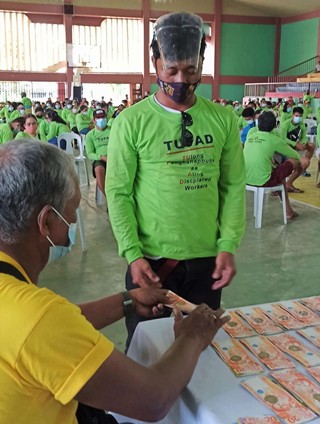 During the payout
conducted last March 12, 2021, each beneficiary received P4,875.00
as wages for their 15-day employment. Accident insurances and
personal protective equipments were provided prior to the start of
their TUPAD engagement.
During the payout
conducted last March 12, 2021, each beneficiary received P4,875.00
as wages for their 15-day employment. Accident insurances and
personal protective equipments were provided prior to the start of
their TUPAD engagement.
Director Henry John S.
Jalbuena, the newly-installed Regional Director of DOLE-RO8
personally attended the said payout. Also present to grace the event
were Congressman Ferdinand Martin Romualdez, House Majority Floor
Leader and Leyte 1st District Representative, Mr. Jude Acidre of
Tingog Partylist and Mayor Amparo Montesa of Sta. Fe.
Director Jalbuena said
that he is privileged to be in the public service, being able to see
the happy faces of the beneficiaries as they receive their money.
“This is really the
essence of being a public servant. We get to see the happiness that
our programs bring to the people. It brings sheer joy knowing that
we are doing our part to help our workers in dire need”, said
Jalbuena.
Through the TUPAD program,
the labor department provides support to the workers from the
vulnerable and marginalized sectors whose livelihoods were affected
by the COVID-19 pandemic. Beneficiaries were engaged in community
clean-up activities for four (4) hours a day to a maximum period of
fifteen (15) days while wearing appropriate PPEs and observing
health protocols.
AppendPay signs
MOA with CARD Banking Group as settlement bank
|
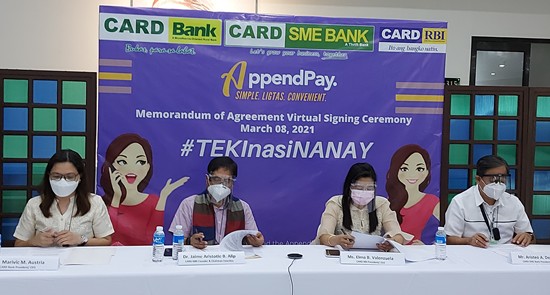
The
CARD Banking Group inked an agreement with AppendPay in
promoting financial inclusion in the country on March 22,
2021. In the photo are (L-R) CARD Bank President and CEO
Marivic M. Austria, CARD MRI Founder and Chairman Emeritus
Dr. Jaime Aristotle B. Alip, CARD MRI Rizal Bank Inc.
President and CEO Elma B. Valenzuela, and CARD SME Bank
President and CEO Aristeo A. Dequito. |
By
CARD-MRI
March 23, 2021
SAN PABLO CITY – As
part of its mission to provide financial inclusivity for all, CARD
Banking Group signed a memorandum of agreement (MOA) with AppendPay
through a virtual signing ceremony on March 8, 2021.
It was attended by CARD
MRI Founder and Chairman Emeritus Dr. Jaime Aristotle B. Alip, CARD
MRI Managing Director Flordeliza L. Sarmiento, CARD Banking Group
President and CEOs Marivic M. Austria (CARD Bank), Elma B.
Valenzuela (CARD MRI Rizal Bank), and Aristeo B. Dequito (CARD SME
Bank). Also present were AppendPay Corporate Founding Board Chairman
Angel de Leon, Jr.; Append President Jeng San Juan; Bangko Sentral
ng Pilipinas Representative Acting Managing Director Ellen Joyce
Suficiencia; MNRC Corporate Governance and Finance Department
Director Atty. Rachel Esther Gumtang-Remalante; and MCPI President
Eduardo C. Jimenez.
Said CARD MRI Founder and
Chairman Emeritus Dr. Jaime Aristotle B. Alip, “Having the CARD
Banking Group as a settlement bank of AppendPay has highlighted the
collaborative environment that the microfinance industry has. The
challenges brought by COVID-19 pandemic gave us the opportunity to
push our digital initiatives to our clients and to their families.”
Dr. Alip explained how the
CARD banking group and the microfinance industry served as the
beacon of hope to the lives of many small microentrepreneurs during
the community quarantines and lockdowns as they faced the challenges
of continuing their businesses and microenterprises. “We saw how the
health crisis really affect the lives of our clients, many
businesses were forced to temporarily stop its operations but
despite the pandemic we decided to continue our financial services
in order for them to surpass the challenges,” he added.
As the whole world
embraces to the new normal, CARD MRI envisions to continuously give
financial access to recover and cope with the changes brought by the
pandemic. “We’re looking forward for the good result of this
collaboration. Through this partnership, we hope to further extend
our services to millions of our clients. Digital platforms such as
AppendPay and konek2CARD enable microfinance institutions to have an
easy and convenient access to financial services.”
The
AppendPay
AppendPay is an online
platform that aims to ease business processes and create seamless
transactions for micro, small, medium and all other social
entrepreneurs (MSMEs) through the assistance of CARD Banking group
as their settlement bank.
“This collaboration is
truly a remarkable moment for each of us. We, at APPEND, appreciate
the effort of CARD Banking group as they open their doors for
AppendPay to provide fast, easy, and convenient eCommerce channels
to clients,” said AppendPay Corp. Founding Board Chairman Angel de
Leon, Jr. during the MOA signing.
He concluded that the
mobile application links APPEND members around the country and
allows the app users to request and pay for the various loans,
utilities and commercial services. Users can also transfer money to
other AppendPay users.
Inflation rate in
EV increases to 2.8% in February 2021
By
PSA-8
March 21, 2021
TACLOBAN CITY –
Inflation Rate (IR) in Eastern Visayas increased to 2.8 percent in
February 2021. This IR is 1.1 percentage points higher compared with
the 1.7 percent IR in January 2021. This is also 0.9 percentage
point higher than the recorded 1.9 percent IR in the same period
last year.
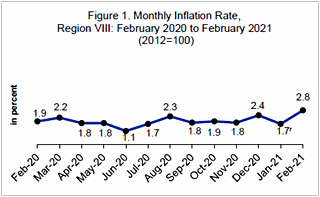 In comparison with the
national average IR, the regional IR is 1.9 percentage points lower
than the 4.7 percent national IR in February 2021.
In comparison with the
national average IR, the regional IR is 1.9 percentage points lower
than the 4.7 percent national IR in February 2021.
All provinces registered
higher IRs in February 2021 compared with their figures in January
2021, except for Northern Samar, which recorded a 0.6 percentage
point decrease from its inflation rate a month ago. Its IR eased
down to 2.7 percent in February 2021 from 3.3 percent in January
2021. Meanwhile, Biliran recorded the highest growth of 2.7
percentage points from its zero IR in January 2021. The rest of the
provinces registered increases ranging from 0.3 percentage point to
1.6 percentage points. Samar posted the highest IR at 6.1 percent,
while Leyte recorded the lowest IR during the month in review at 1.9
percent.
Majority of the commodity
groups in the region exhibited higher IRs in February 2021 compared
with their rates in January 2021. Food and non-alcoholic beverages
commodity group and housing, water, electricity, gas, and other
fuels commodity group both registered the biggest increase in IR at
1.6 percentage points. IR for food and non-alcoholic beverages
commodity group rose to 3.5 percent in February 2021 from 1.9
percent in January 2021. Contributing largely to this increase is
the fish index which registered a 4.8 percentage points increase in
IR, from 0.3 percent in January 2021 to 5.1 percent in February
2021.
Vegetables index continued
to register double digit IR in February 2021 at 19.6 percent, 3.7
percentage points higher than its 15.9 percent IR a month ago.
Prices of meat picked up by 5.3 percent in February 2021 from 3.1
percent in January 2021. Corn, rice, and bread and cereals indices
continued to register deflations but at slower rates of 2.7 percent,
2.1 percent, and 1.2 percent, respectively. Meanwhile, IR for fruits
index managed to shed off by 0.8 percentage point from its
double-digit figure of 12.0 percent in January 2021, posting 11.2
percent IR in February 2021. Decreased IRs were also registered in
the indices for food products not elsewhere classified (6.7%); oils
and fats (5.5%); milk, cheese and eggs (2.8 percent); non-alcoholic
beverages (2.4%); and sugar, jam, honey, chocolate and confectionery
(0.7%).
Housing, water,
electricity, gas and other fuels commodity group which registered
1.4 percent deflation in January 2021 recorded price increase in
February 2021 at 0.2 percent. The 0.7 percent deflation in the index
for electricity, gas, and other fuels was offset by the IRs in the
indices for maintenance and repair of the dwelling (1.6%); actual
rentals of housing (0.6%); and water supply and miscellaneous
services relating to the dwelling (0.3%).
IR for transport commodity
group increased by 0.6 percentage point, from 5.6 percent in January
2021 to 6.2 percent in February 2021. This can be attributed to the
higher IR (1.7%) posted in the index for operations of personal
transport equipment.
Compared with their
January 2021 levels, the IRs for furnishings, household equipment
and routine maintenance of the house commodity group (2.5%) and
health (1.2%) commodity group both inched up by 0.1 percentage point
in February 2021.
Recreation and culture
commodity group continued to post deflation but at a slower rate,
settling at 1.0 percent during the month in review.
On the other hand,
alcoholic beverages and tobacco commodity group recorded 0.5
percentage point decrease in its IR, from 7.4 percent in January
2021 to 6.9 percent in February 2021. This can be traced to the
lower IR in the indices for both alcoholic beverages (3.5%) and
tobacco (8.9%).
IR for restaurant and
miscellaneous goods and services commodity group eased by 0.2
percentage points, settling at 3.9 percent in February 2021.
The commodity groups of
clothing and footwear and education retained their previous month’s
IRs at 2.5 percent and 0.4 percent, respectively. Meanwhile,
communication commodity group retained its previous month’s
deflation at 1.5 percent.
The Purchasing Power of
Peso (PPP) of the region remained at P0.77 in February 2021. This
PPP implies that the goods and services worth P77.00 in 2012 is
worth P100.00 in February 2021.
Compared to their levels
in January 2021, PPP in Biliran weakened by P0.02, while PPP in
Leyte, Southern Leyte, Eastern Samar, and Northern Samar declined by
P0.01 in February 2021. Samar, meanwhile, retained its previous
month’s PPP. Biliran and Leyte recorded the strongest PPP among
provinces in February 2021 at P0.79. Southern Leyte ranked second at
P0.78, followed by Eastern Samar at P0.74 and Northern Samar at
P0.71. Samar posted the weakest PPP during the reference month at
P0.70.
